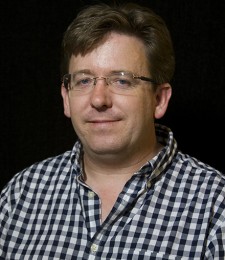Professor, School of Marine Science & Policy
University of Delaware
Delaware Biotechnology Institute
590 Avenue 1743
Newark, DE 19713
Email: tehanson@udel.edu
Phone: (302) 831-3404
Fax: (302) 831-3447
Website: http://www.ceoe.udel.edu/our-people/profiles/tehanson
SciNav Link: http://scinav.udel.edu/individual.php?lastname=%27Hanson%27&firstname=%27Tom%27
B.S. Bacteriology, University of Wisconsin, 1992
Ph.D. Microbiology, University of California, 1998

My research program is focused on identifying and understanding the physiological strategies and adaptations that allow microorganisms to survive and compete in the environment. Our understanding of real world microbial physiology is currently limited. While microorganisms constitute a significant amount of the biomass and biodiversity on earth, only a small fraction of all the microorganisms in nature have been cultured. Furthermore, genome sequences of cultured microorganisms reveal that 32-75% of predicted genes encode proteins of unknown function. Presumably these genes are present in particular organisms because they confer the ability to effectively compete for specific ecological niches in the environments where the organisms live. These observations suggest that microorganisms contain a wealth of undiscovered physiological and genetic potential and that we do not fully understand what genetic complement is required for success in situ.
Genomics and proteomics, in tandem with physiological and process level studies, can be applied to identify and analyze genes and proteins that are present and active in pure cultures and environmental samples. My goal is to utilize these technologies initially in model systems to identify and assign physiological functions to proteins with unknown or incorrect functional assignments from genome sequencing projects. This will be followed by the environmental application of these technologies.
Current research is focused on dissecting the specific physiological role of the RubisCO-like protein (RLP) from the phototrophic bacterium, Chlorobium tepidum. Studies of a C. tepidum mutant lacking the RLP have uncovered integrative links between sulfur metabolism and stress responses in this bacterium. Specific projects include low molecular weight thiol metabolism, stress response mechanisms, genetic studies of predicted sulfur metabolic pathways and RLP sequence isolation for comparisons between pure cultures and environmental samples. Future research will apply the experience gained in these initial studies to natural populations of C. tepidum to correlate specific protein expression patterns with in situ physiology.
Dr. Hanson is a native of Madison, Wisconsin where he received his B.S. in Bacteriology from the University of Wisconsin. He carried out his doctoral research in Microbiology under the supervision of Prof. John C. Meeks at the University of California at Davis. He was a postdoctoral fellow at The Ohio State University with Prof. F. Robert Tabita where he initiated studies of the C. tepidum RLP and his current research projects. He has presented his research at international conferences in Italy, Austria, Japan, Germany and the U.S. His peer-reviewed work can be found in The Proceedings of the National Academy of Sciences, Microbiology and Microbiological Reviews (now MMBR).